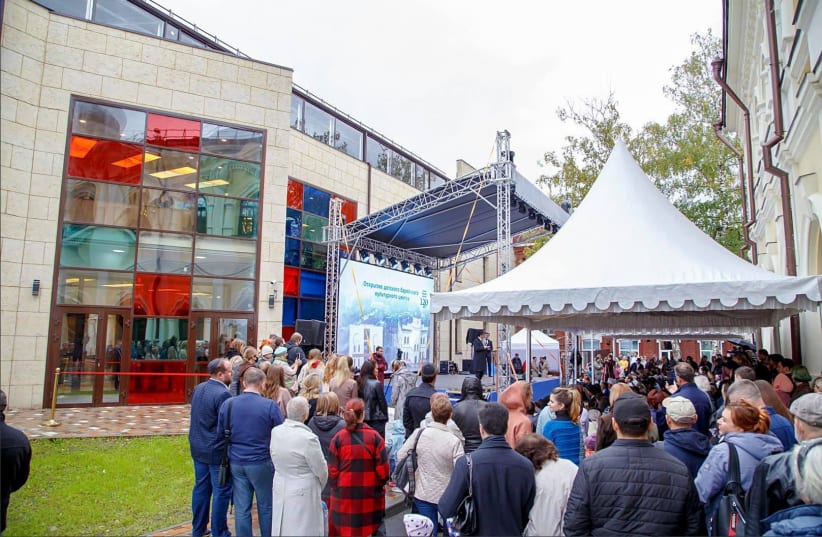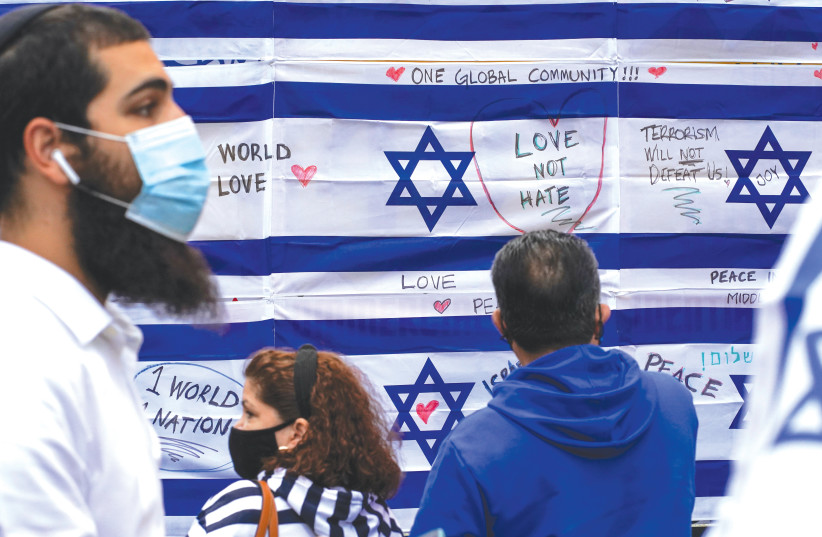One of my students told me one day, “American Jews don’t have the same relationship to Israel that you Russian Jews have.”
This young lady went to a prominent Jewish day school where she learned that Israel was conceived as a spiritual center for the Jewish people – a place where grandparents visit, bar and bat mitzvahs are had, and distant relatives reside. When I asked her to tell me more about what exactly she had learned about Israel, she replied, “you know, that Golda was a woman, and Herzl had a dream.” In that pithy response, she had summed up American Jewish education on Israel and American Jewry’s relationship with it.
At her school, she learned that Israel is an outpost of liberalism in the Mideast. It is for this reason that the phrase “light onto the nations” resonates strongly with American Jewry, and pro-Israel groups stress Israel’s diversity and democracy. Unfortunately, the stress on the Israel that “does” has left most unprepared to defend against the relentless military and PR war waged by the Arab Palestinians, and to navigate the impossible moral dilemmas facing an enemy that exploits the lives and dignity of its own people.
The relationship to an Israel that “does” rather than “is” has put this girl, and much of American Jewry, at a disadvantage. “It took me a while,” she admitted, “to realize things.”
The romanticized “Golda” and “Herzl’s Dream” version, she was intimating, ultimately gave way to the sobering reality of hearing about Israel’s misdeeds: stealing land, discriminating against Palestinians, killing children. Painfully, in the relationship of “does,” Jews will forever be catching up with headlines: “Settlers storm al-Aqsa,” “Forced expulsions in Sheikh Jarrah,” “Israeli violations of international law in occupied Palestinian lands,” and so on.
I receive texts and calls from students asking to clarify anti-Israel headlines and accusations. Typically, the student asks: “Is this true?” I have come to call it the ‘Is this true’ moment, a painful reminder that today’s Jewish youth don’t have the security and confidence in their people to give them the benefit of the doubt.
But I was once their age, and I too went to a Jewish day school. Why didn’t I have the ‘Is this true’ moment? And in college when I encountered the “apartheid wall,” the mock checkpoints, and the accusation of stealing land, I said to myself, “no, not my mother. Not my people.” I wasn’t an expert on the Arab-Israeli conflict. So from where came my confidence and convictions to proclaim this was Jew-hatred masquerading as anti-Zionism? The answer is simple and will seem inadequate to scholars: my parents and more specifically, my mother.
My mother’s favorite writer is the German novelist Lion Feuchtwanger. A Jew from Bavaria, Feuchtwanger wrote epic novels based on Jewish history. One such novel, The Josephus Trilogy, details the Judean wars, culminating with the massive occupation of Judea. Mother spoke with fervor of how the Romans conquered the Jews and renamed the land Palestine. “They renamed it Palestine,” mother said, “to stick it to the Jews! To erase their name from history!”
Feuchtwanger wasn’t just a favorite writer for my mother and her peers. In the Soviet Union, where religious practice was largely forbidden, reading Feuchtwanger was a rare access point into Jewish history and identity. For Soviet Jews, The Josephus Trilogy was a midrash. And so, while American Jews gathered in shuls and practiced their faith freely, Russian-speaking Jews gained historical knowledge centering on a strong sense of ethnic belonging and came to the anti-Zionist battlefield prepared.
One day during the height of the Soviet Jewry movement, when mother was still living there, she took a trolleybus. A Ukrainian woman looked at my mom, pursed her lips and said, “Why don’t you all just go back to Palestine.” Because for the non-Jewish mind throughout history, Palestine was always Jewish land.
Mother told me about the time when someone at work accused her of transforming the workplace into a “Zionist nest.” She concluded: “Just remember, when they say Zionist, they mean you.”
In 2000, the promise of the Oslo Accords culminated in the Camp David summit wherein Arafat rejected the proposal for a Palestinian state. American news outlets went ablaze, and American Jewish institutions hosted talks and panels on what went wrong.
At my dinner table, our family discussed the creation of Jordan which was carved out of a British Mandate of Palestine promised to the Jews. My grandfather waved his hand at the telly and said, “but there is a two-state solution already: Jordan!” And mother, standing up at a synagogue event on the “Two-State Solution: What Went Wrong” speaking with zest, not caring whether her thick accent precluded anyone from understanding: “But tell me, why Palestinian cause was never issued when Jordan occupied the same territory?”
In piecemeal, I have recovered these moments that were trivial to me in those days. Collectively, these stories prepared me for what I encountered on campus. When I heard that Jews stole the land, I heard my mother retelling me about Feuchtwanger’s Judean wars; when I heard that “Palestine will be free,” I imagined my mother sitting on the trolleybus, her hands folded over her chest as the frost of the winter seeped through the windows, and the Ukrainian woman snickering, “Go back to your Palestine!”; When the university administrators told me this was anti-Zionism, not antisemitism, I heard the ringing of “Zionist nest” in my ears.
Cries of “Israeli apartheid” and “Zionism is racism” elicited from my memory the worried look on my mother’s face as she decried, “The Americans may have won the Cold War, but the Soviets won on the ideological front.” The Soviets manufactured anti-Zionism, she said, they slurred Israel as Nazi, an imperial outpost, and accused Zionism of racism.
What this all amounts to are lessons in the form of intimate conversations with my family who made it their mission to pass on to me the conditions of their lives, not just as Soviet Jews, but as citizens of a rotten regime. In effect, what their encounters with radical left-wing antisemitism did was prepare me for my encounter with it on campus.
So when my students bring me their “is this true” moment, I say, “Imagine someone just saw your mom punch another woman and steal her purse. What do you say?” They laugh. I say, “Don’t laugh. Someone saw it and told it to me.” They retort, “My mother wouldn’t do that.”
Imagine just how much better it would be if Jews in the Diaspora would start from this place? The work is certainly in education, but more importantly, it is in transforming Jewish identity, and the relationship Jews have with one another, to Israel, and their shared destiny.
The writer was born in Ukraine and came to the US with her family in 1989. She earned her PhD in Russian Literature from UCLA. She is currently director of education for Club Z, a rapidly growing Zionist youth movement.

